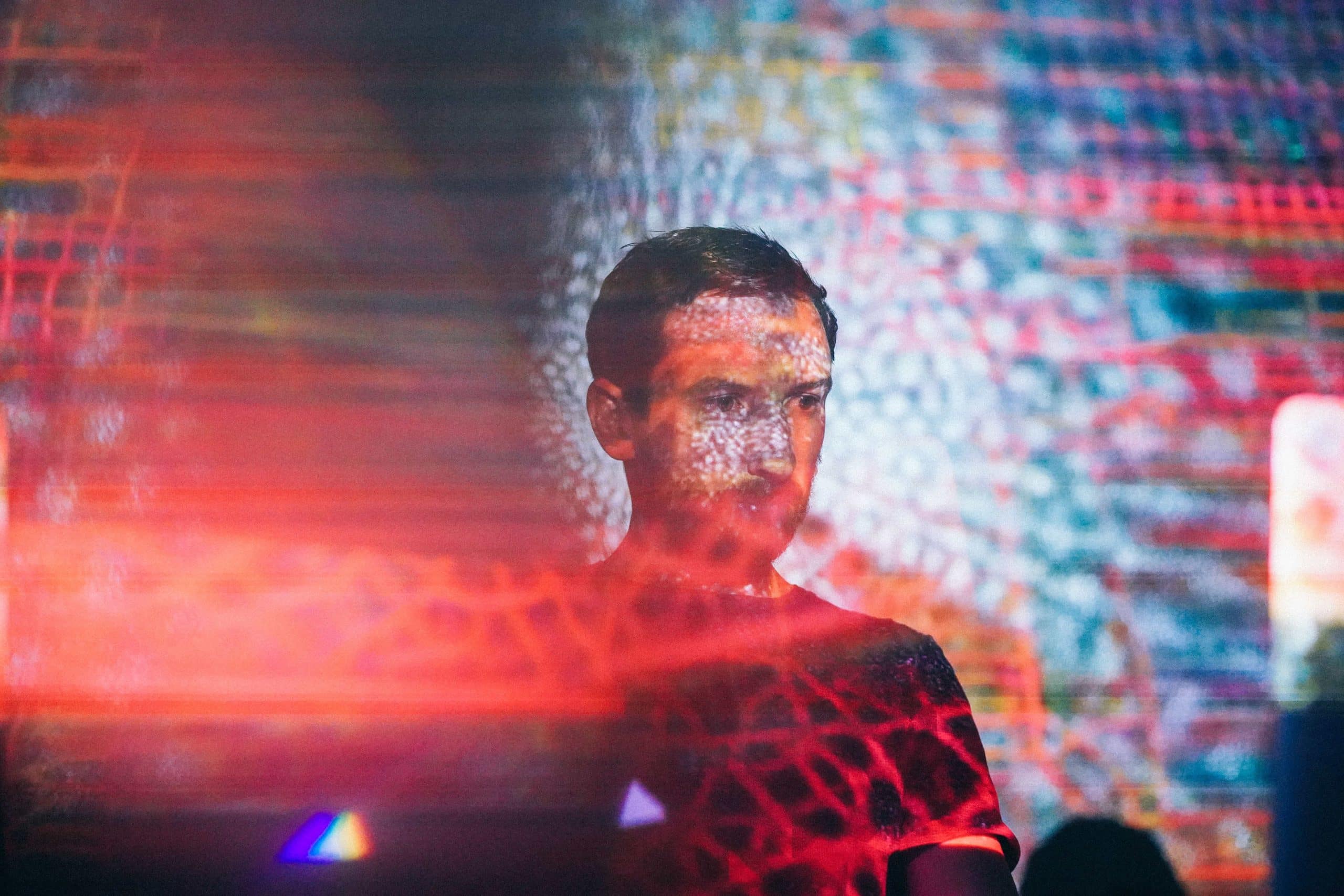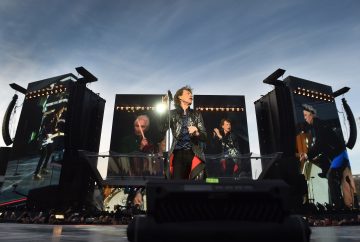
Max Cooper is a London-based electronica and techno producer who has been releasing music since 2007. A trained geneticist, Cooper received a PhD in Computational Biology from the University of Nottingham before deciding to dedicate himself entirely to music.
He debuted Yearning for the Infinite, his latest audiovisual project, at the Barbican at the end of September, and Cooper is set to perform the show in Berlin later this month. The project explores the theme of the human pursuit of the unattainable and required Cooper to commission custom-made software to combine visual depictions of the infinite with a live performance of the album of the same name.

Max Cooper’s audiovisual ‘Yearning for the Infinite’ at the Barbican played with our desire to attain the unattainable
I’ve never seen a stage performance quite like Yearning for the Infinite – the visuals were incredible. How did you approach this side of the show?
The Barbican is such a beautiful hall, I wanted to use the interior as a canvas. Once I had the really simple idea of Yearning for the Infinite – this idea of endless pursuit – I had to think about how to visualise it. I did a lot of research about the history of the infinite in religion, arts and sciences and then employed these different visualisation techniques in combination with footage of people and life – to try to draw parallels between human nature and these science-related ideas of infinity.
The Barbican is such a beautiful hall, I wanted to use the interior as a canvas
You talk about wanting to use the Barbican hall as a canvas. You definitely achieved that – I had a real sense of being bathed in light, at the centre of this big infinite machine. Could you tell me a bit more about that idea?
The idea was to create these big infinite structures that engulfed the audience. One thing that was interesting was projecting into the audience so that the people in the stalls level were actually inside the projection. And I don’t so much like the aesthetic of the performer on the stage really far away from everyone – I’d much rather the performer is in it – and I also wanted to be in the show, so I projected onto myself too. It helps me to feel more a part of it, and when I enjoy it, I perform better. The idea is to bring people into this shared abstract space, which is something I’ve been working on for a few years and I suppose this is the next step.

Cooper conducted extensive research into the concept of the ‘infinite’ in religion, art and science
I assumed, because of the central theme of human striving, that Yearning for the Infinite was a comment on materialism. But is it more than just that?
Definitely. Materialism is one part of that human desire for betterment but I see it as about all our positive drives as well – the drive to become a great athlete, or to find a cure for a particular cancer or to search for spiritual enlightenment. People are driven to many different ends. People obsess about things and they’re driven to pursue quite abstract ideals for lots of different reasons. I think what’s key is the creation of meaning. As humans, I believe, we need something to care about, the end of which we can’t reach – because that’s a source of meaning that we can always rely on.
Materialism is one part of that human desire for betterment
The sporting analogy is an easy one. If you support a team, you want them to win the local cup, then you want them to win the national cup, then you want them to win the European Cup – and if you win the World Cup, you want them to win the World Cup again. When we have these things in our lives, when there is no ending, then it’s a source of meaning and it enriches our lives. Obviously some people might choose to enrich their lives through material or financial gain – and perhaps that’s the more negative side of the story.

Cooper says humans’ obsession with the material is a desire for betterment
Do you think it’s fulfilling or restricting to strive?
Everyone gets up and pursues things – and it’s an interesting aspect of human nature that we’re stuck in our little machines, inside the wheel. Like the hamster in the wheel, we’re all inside some sort of wheel – partly of our own making, and partly not – a lot of the time. People often are stuck in a system they don’t have much control over, and a lot of the time we don’t exist outside these systems but as part of them. We’re all just carrying out the thoughts and the processes that we’re conditioned to. Which isn’t a positive or a negative assessment – I think it’s more just of a realistic one. We’re all limited and biased and often we’re not free to drop our biases and just think that we’re human. I like that type of abstracted commentary on humans and society – and the task of trying to translate that into aesthetics.
We’re all just carrying out the thoughts and the processes that we’re conditioned to
It struck me that there are probably more and more iterations of infinity. I remember hearing recently that 300 hours of YouTube content is uploaded every hour – so there is a timely aspect to Yearning for the Infinite. We seem to be living through this ever-quickening period. The infinite is becoming everyday.
That was one of the core ideas the Barbican asked me to include – and Yearning for the Infinite is partly my reaction to that. I grew up in the pre-mobile phone era. I’ve experienced this transition from a very different lifestyle to the information barrage becoming ever more intense. It’s something I definitely have a reaction to.

The show focused partly on the barrage of information that came with the advent of the smartphone and social media
Art and technology have an uneasy relationship. Art is ultimately about storytelling. Do you think computers will ever be able to take over from humans as storytellers?
No, I don’t. I think the thing with storytelling is that it relies on someone having experienced something. For example, if someone’s going to write music about hardship or feeling, you’re going to want to believe they’ve experienced that and that’s what they’re communicating. So there’s that inherent human aspect to it – that we embody the things we’re trying to speak about. And I think until machines can embody experiences, it’s going to be hard for people to take their stories seriously. But if a machine wrote a beautiful story about someone having these things happen in their lives – I suppose it could be total fiction and still be moving.
Until machines can embody experiences, it’s going to be hard for people to take their stories seriously
You obviously work on computers, and you studied in computational biology. Could you say a little bit more about the relationship between computers and machines?
It’s impossible to separate out computers from humans. Computers are simply extensions of the human mind – they wouldn’t exist if we hadn’t created them. To an extent, we have created computers in our own image. If I’d been living 50 years ago, I wouldn’t have been able to be a musician. I’m only a musician because I learned how to use a computer and music makes me feel strongly – and that’s all I need in order to do what I do.

For Max, computers are simply extensions of the human mind
There tend to be these two views of the future to which we’re heading. One is dystopian, that AI will eat us. The other is more optimistic: technology will enable humans to learn new skills. How do you feel about the future?
Absolutely I’m an optimist. My first exposure to computers was playing games on early computers, but it wasn’t until later in my life that I realised what computers could enable me to do in terms of scientific expression. All my scientific research ended up being computational. Computers have totally enabled me to express myself and learn – and I do see them as the most amazing extension of the human mind. The positives far outweigh the negatives. And they will allow us to solve otherwise insurmountable problems. So I’m an optimist. We have a lot of things to fix, and a lot of bad stuff going on – but we also, thanks to technology, have the tools to solve those problems.
Max Cooper’s Yearning for the Infinite is available on Vinyl, CD & Digital via Mesh from 7 November.




